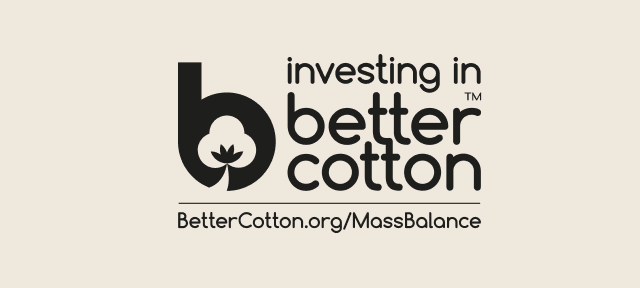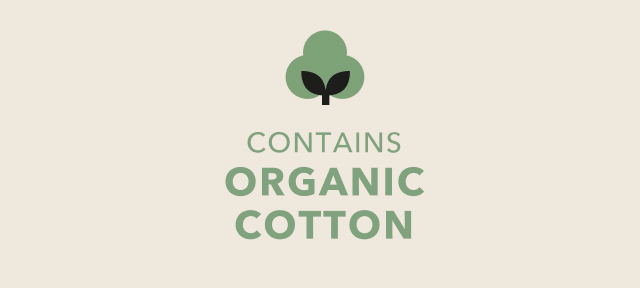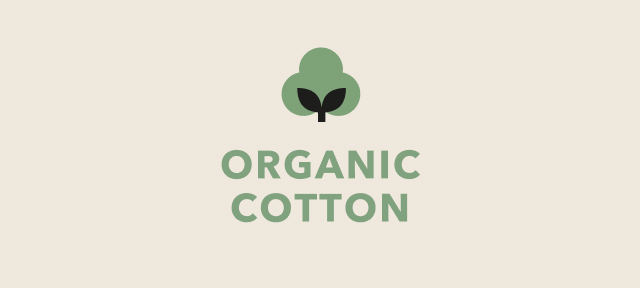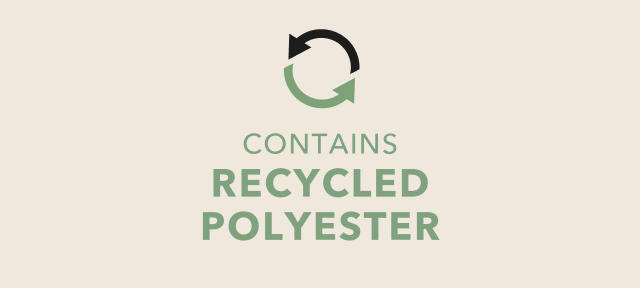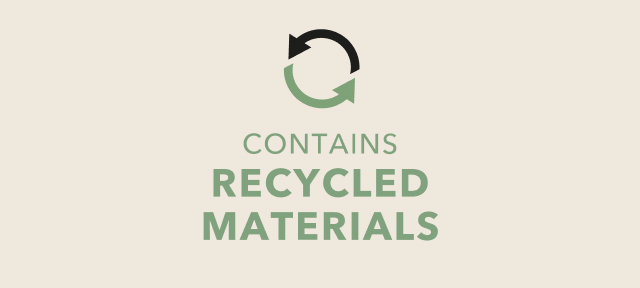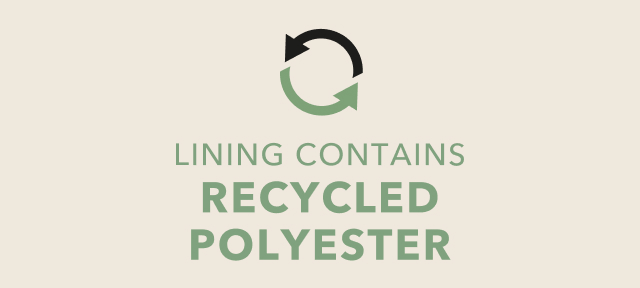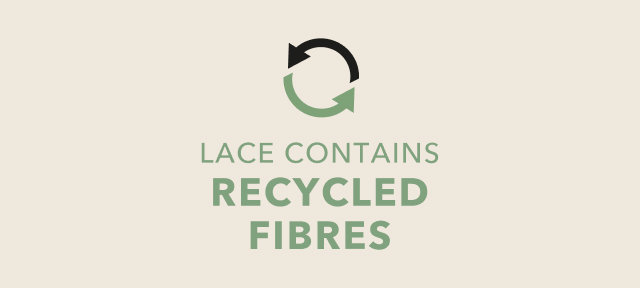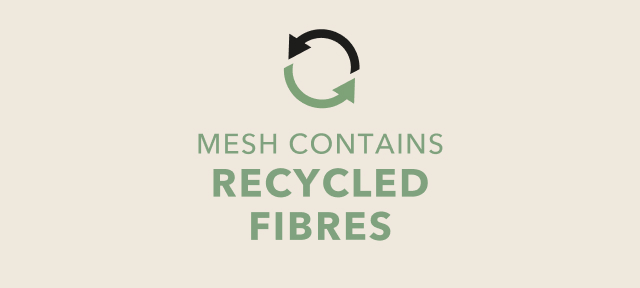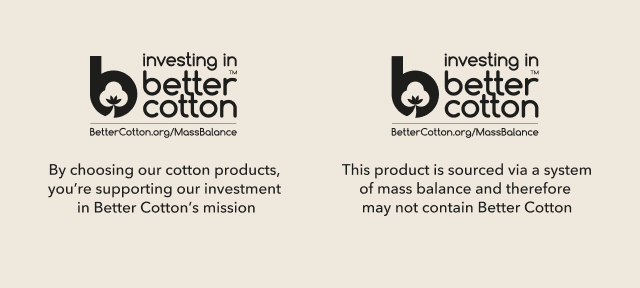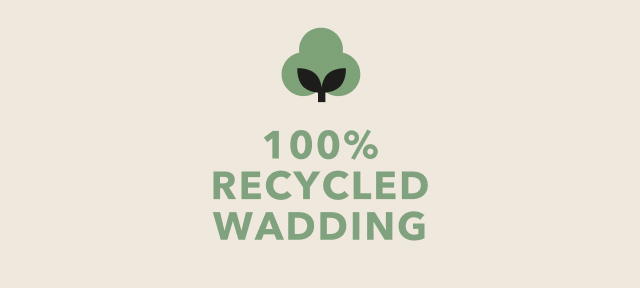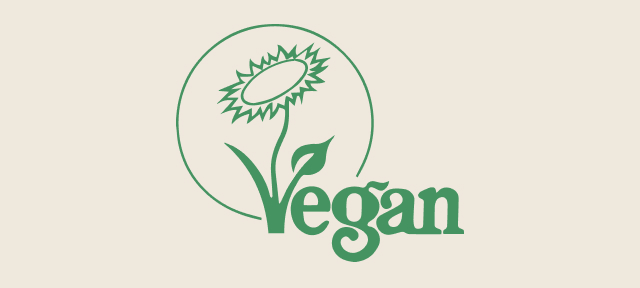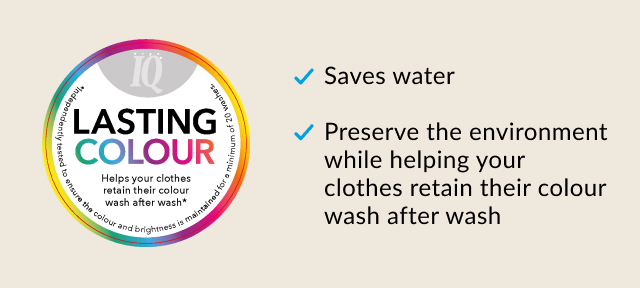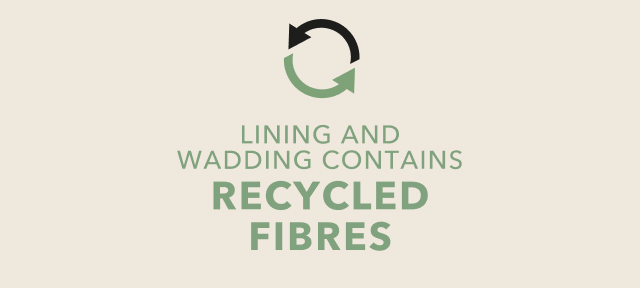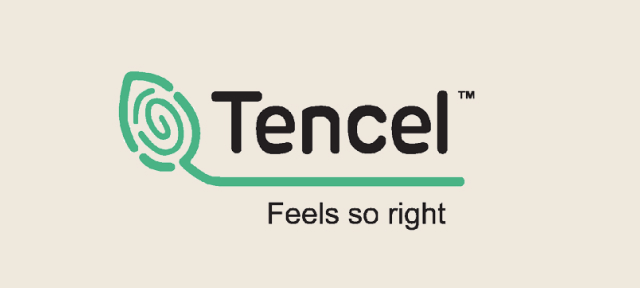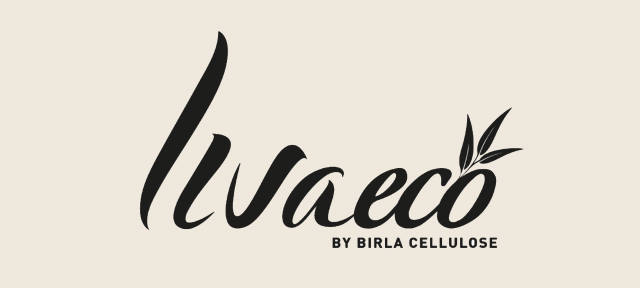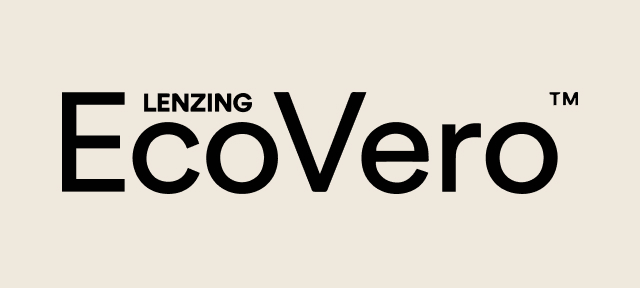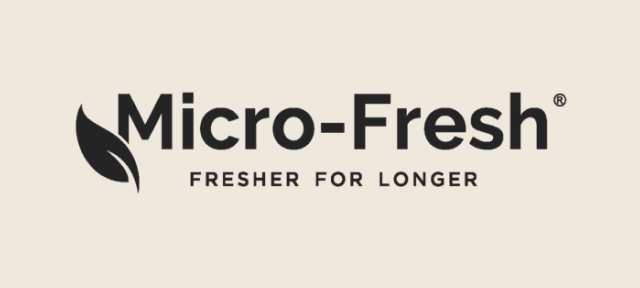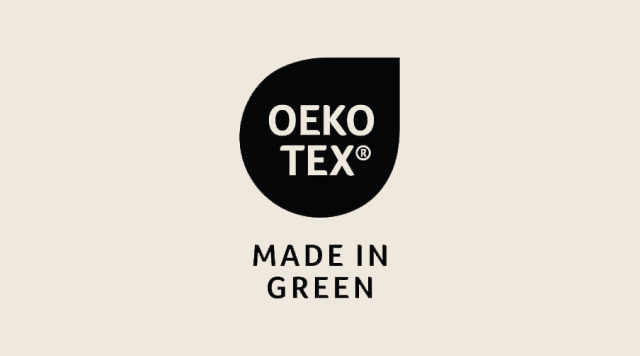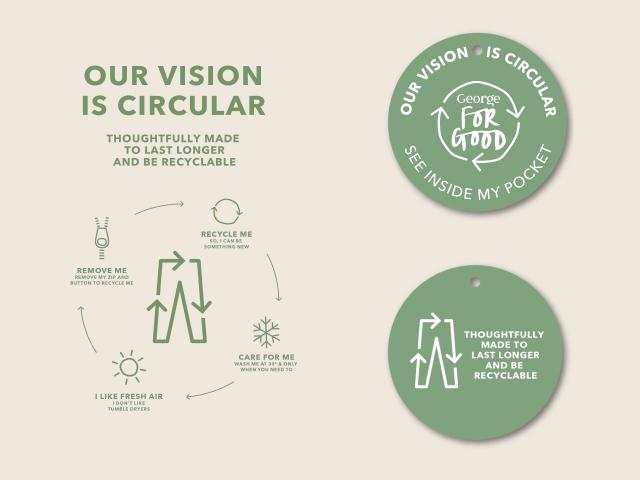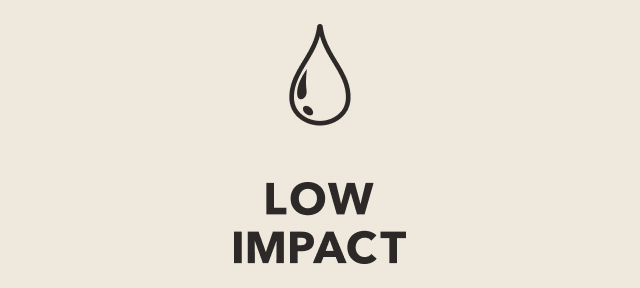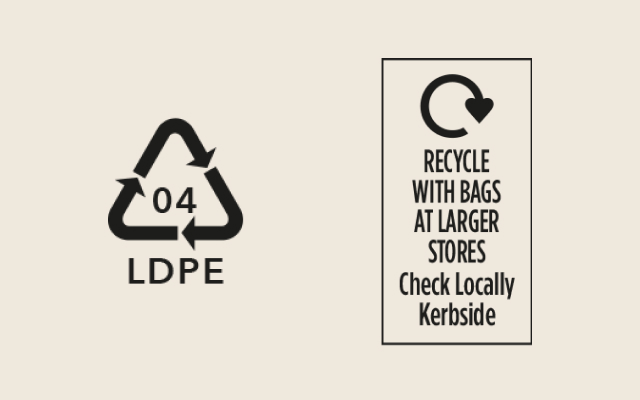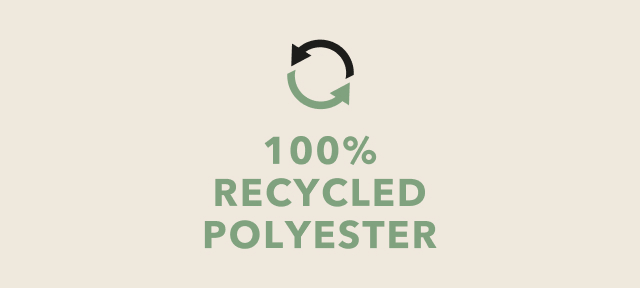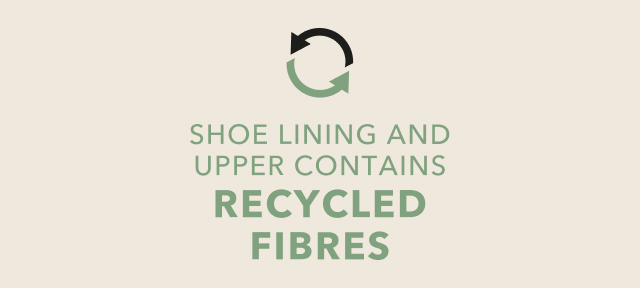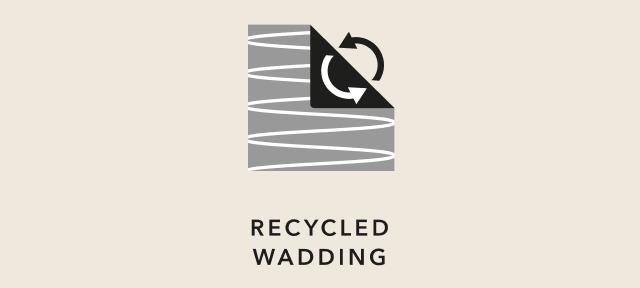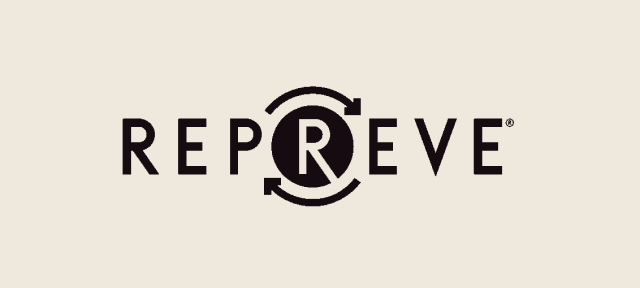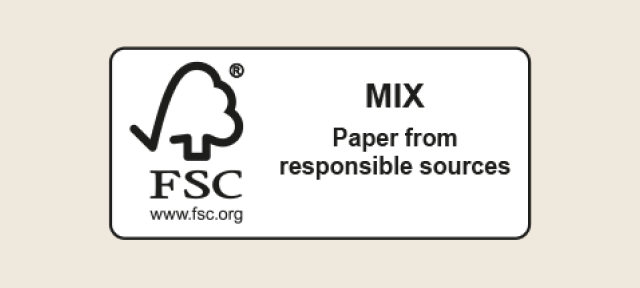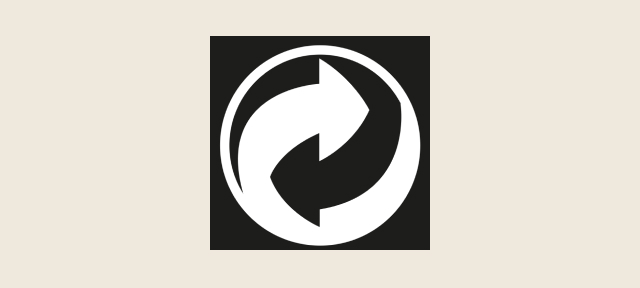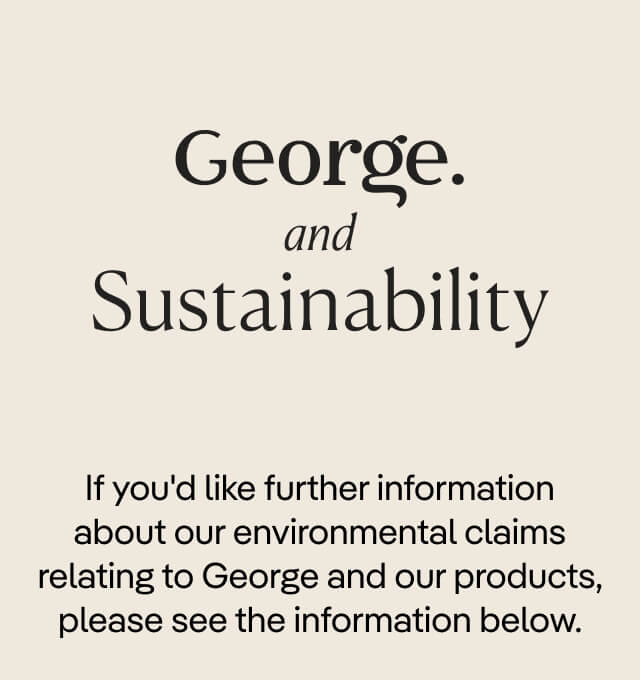
All cotton content within this product is sourced via Better Cotton's Mass Balance System.
By 2025, all of the cotton contained in George clothing, accessories and footwear products will be sourced through Better Cotton. The Cotton within this product has been sourced through the Better Cotton Mass Balance System.
Through its implementing partners, Better Cotton trains farmers to use water efficiently, care for soil health and natural habitats, reduce use of the most harmful chemicals and respect workers’ rights and wellbeing.
Better Cotton is sourced via a chain of custody model called Mass Balance. This means that Better Cotton is not physically traceable to end products, however, Better Cotton Farmers benefit from the demand for Better Cotton in equivalent volumes to those we ‘source.’
Our suppliers source the cotton on our behalf, we monitor the volume of cotton used in our products which determines the financial contribution we make to Better Cotton directly to support the program.
This is in relation to the cotton fibres of this item only.
A minimum of 25% of the total garment fibre composition is Organic but there are other fibres within the product too. This is certified via the Organic Content Standard (OCS).
George does not have a target for organic cotton content within George clothing, accessories and footwear products.
The Organic Content Standard aims to increase organic agricultural production, this is a voluntary global standard that sets the criteria for third-party certification of organic materials and chain of custody.
The Textile Exchange is a non-profit which aims to drive beneficial impact on climate and nature across the fashion, textile and apparel industries. To further this aim, it has developed a number of voluntary standards relating to organic, recycled and responsibly sourced fibres to help companies and consumers to verify sustainability claims. Through the OCS specifically, it aims to give: the industry a means to verify the organically grown content of the products they buy; companies a way to communicate their organically grown content claims to the industry; and give organic fibre farmers access to the global organic market for their products.
Our suppliers source the cotton on our behalf and provide us with scope and transaction certificates, verified by an approved governing body to certify that this product has met all requirements of the OCS standard. George does not directly financially contribute to these organisations as part of the above process.
This is in relation to the cotton fibres of this item only.
100% of the cotton is organic cotton. This is certified by either OCS or GLOBAL ORGANIC TEXTILE STANDARD (GOTS).
George does not have a target for organic cotton content within George clothing, footwear and accessories products.
GLOBAL ORGANIC TEXTILE STANDARD (GOTS) is a textile processing standard for organic fibres backed up by independent certification of the complete textile supply chain. The aim of the standard is to define globally recognised requirements that ensure organic status of textiles, from the harvesting of the raw materials, through environmentally and socially responsible manufacturing, to product labelling that provides a credible assurance to the end consumer.
The Textile Exchange is a non-profit which aims to drive beneficial impact on climate and nature across the fashion, textile and apparel industries. To further this aim, it has developed a number of voluntary standards relating to organic, recycled and responsibly sourced fibres to help companies and consumers to verify sustainability claims. Through the OCS specifically, it aims to give: the industry a means to verify the organically grown content of the products they buy; companies a way to communicate their organically grown content claims to the industry; and give organic fibre farmers access to the global organic market for their products.
The Organic Content Standard (OCS) aims to increase organic agricultural production, this is a voluntary global standard that sets the criteria for third-party certification of organic materials and chain of custody.
Our suppliers source the cotton on our behalf and provide us with scope and transaction certificates, verified by an approved governing body to certify that this product has met all requirements of the OCS or GOTS standard. George does not directly financially contribute to these organisations as part of the above process. This is in relation to the cotton fibres of this item only.
A minimum of 25% of the cotton in this product is recycled cotton. This is certified by either Global Recycle Standard (GRS) or Recycle Claim Standard (RCS).
George does not have a target for recycled cotton content within George clothing, footwear and accessories products.
Our suppliers are required to work to the Global Recycled Standard (GRS) or the Recycled Claim Standard (RCS), both of which are an international, voluntary standard that sets out requirements for independent parties to verify recycled content in a given product using evidence to prove chain of custody of the recycled fibres. This chain of custody is proven with a transaction certificate which verifies the passing of the recycled content through the supply chain. We also require the facilities in the supply chain to possess a scope certificate which demonstrates they can take possession of the recycled content.
The Textile Exchange is a non-profit which aims to drive beneficial impact on climate and nature across the fashion, textile and apparel industries. To further this aim, it has developed a number of voluntary standards relating to organic, recycled and responsibly sourced fibres to help companies and consumers to verify sustainability claims. Through the GRS and RCS specifically, it aims to, through their voluntary standard and other initiatives, aim to: align definitions of “recycled” across different applications; verify recycled content in products; and enable brands and consumers to make informed buying decisions.
Our suppliers can use several independent parties to verify their transactions and provide them with the certification we require. Our suppliers source the recycled cotton on our behalf and provide us with scope and transaction certificates, verified by an approved governing body to certify that this product has met all requirements of the GRS or RCS standard. George does not directly financially contribute to these organisations as part of the above process. This is in relation to the cotton fibres of this item only.
100% of the pulp and paper used within this product is certified by either Forest Stewardship Council (FSC), or Programme for the Endorsement of Forest Certification (PEFC).
Forest Stewardship Council (FSC)
Recognised timber certification scheme for the use of wood pulp in the manufacturing supply chain. FSC certification ensures that products come from responsibly managed forests that provide environmental, social and economic benefits. Their principles and criteria provide a foundation for all forest management standards globally.
Programme for Endorsement of Forest Certification (PEFC)
PEFC is the world’s largest forest certification scheme and supplier of certified wood fibre. It is an international non-profit organisation dedicated to promoting sustainable forest management through independent third-party certification. Through its robust chain of custody standard, PEFC establishes the responsibly sourced link between forests and end users.
Our suppliers source fibres and fabrics on our behalf and provide us with relevant certificates, verified by an approved governing body to certify that this product has met all requirements of the FSC or PEFC standard. George does not directly financially contribute to these organisations as part of the above process. This is in relation to the pulp & paper fibres of this item only.
100% of the Viscose used within this product is certified by either Forest Stewardship Council (FSC), or Programme for the Endorsement of Forest Certification (PEFC) and is supplied from a Green Shirt viscose supplier (based on Canopy's Hot Button report).
Since 2020, all of the viscose used in George products must be sourced through an FSC source and the fibre produced by a Green Shirt supplier on the Hot Button Canopy Report. Viscose is derived from wood pulp cellulose. The cellulose is extracted from wood, and turned into fibres using a chemical process.
Forest Stewardship Council (FSC)
Recognised timber certification scheme for the use of wood pulp in the manufacturing supply chain. FSC certification ensures that products come from responsibly managed forests that provide environmental, social and economic benefits. Their principles and criteria provide a foundation for all forest management standards globally.
Programme for Endorsement of Forest Certification (PEFC)
PEFC is the world’s largest forest certification scheme and supplier of certified wood fibre. It is an international non-profit organisation dedicated to promoting sustainable forest management through independent third-party certification. Through its robust chain of custody standard, PEFC establishes the responsibly sourced link between forests and end users.
Canopy’s Hot Button Report
Canopy produces a Hot Button Report which analyses primary fibre producers in the fashion sector with a focus on forests. The Hot Button identifies risk of man made cellulosic fibres {MMCF} producers sourcing from high-carbon forests and highlights leadership in Next Gen production — and points to other important data needed for informed purchasing, including ZDHC’s work on chemical processing. Fibre producers are rated and given a number of “buttons” {rating} allocated to producers based on their work to eliminate the use of Ancient and Endangered Forests in their supply and to give preference to textiles made from innovative fibres. Criteria and further detail is provided on the Canopy website. If a supplier is a Green shirt supplier, it signals to the marketplace that these producers have met, or are on course to meet, the requirements of brands and retailers that are part of the CanopyStyle initiative.
Our suppliers source fibres and fabrics on our behalf and provide us with relevant certificates, verified by an approved governing body to certify that this product has met all requirements of the FSC or PEFC standard. George does not directly financially contribute to these organisations as part of the above process. This is in relation to the viscose fibres of this item only.
A minimum of 30% of the polyester used within this product, is recycled polyester. This is certified by either Global Recycle Standard (GRS) or Recycle Claim Standard (RCS).
By January 2025, George policy is all polyester within our products must contain a minimum of 30% recycled content.
Polyester is a synthetic fibre made from crude oil, using virgin polyester creates demand for fossil fuel extraction which is why we have set a target for recycled polyester which in turn reduces the demand for fossil fuel extraction and the creation of virgin polyester fibre. We work alongside our buying teams and supplier partners to ensure when we design product that contains polyester, we include where possible a % that contains recycled fibres. We continually monitor our clothing teams to ensure we are on track to meet this target and offer support on this where required conversation and education.
Recycled polyester can be made from recycling textile waste {already in fibre/fabric form} or from plastic which is melted down to form PET chips. Both of these sources are used to create new fibre which is then spun into yarn and in turn made into new fabric.
The Textile Exchange is a non-profit which aims to drive beneficial impact on climate and nature across the fashion, textile and apparel industries. To further this aim, it has developed a number of voluntary standards relating to organic, recycled and responsibly sourced fibres to help companies and consumers to verify sustainability claims. Through the GRS and RCS specifically, it aims to, through their voluntary standard and other initiatives, aim to: align definitions of “recycled” across different applications; verify recycled content in products; and enable brands and consumers to make informed buying decisions.
Our suppliers are required to work to the Global Recycled Standard (GRS) or the Recycled Claim Standard (RCS), both of which are an international, voluntary standard that sets out requirements for independent parties to verify recycled content in a given product using evidence to prove chain of custody of the recycled fibres. This chain of custody is proven with a transaction certificate which verifies the passing of the recycled content through the supply chain. We also require the facilities in the supply chain to possess a scope certificate which demonstrates they can take possession of the recycled content.
Our suppliers can use several independent parties to verify their transactions and provide them with the certification we require.
Our suppliers source the Polyester on our behalf and provide us with scope and transaction certificates, verified by an approved governing body to certify that this product has met all requirements of the GRS or RCS standard. George does not directly financially contribute to these organisations as part of the above process. This is in relation to the polyester fibres of this item only.
At least 25% of the overall product composition has a recycled content. This claim means multiple elements within this product have recycled content. This is certified by either Global Recycle Standard (GRS) or Recycle Claim Standard (RCS).
George policy is that at least 25% of the overall product fibre composition has a recycled content but there is no specific target for recycled fibres except for polyester.
Our suppliers are required to work to the Global Recycled Standard (GRS) or the Recycled Claim Standard (RCS), both of which are an international, voluntary standard that sets out requirements for independent parties to verify recycled content in a given product using evidence to prove chain of custody of the recycled fibres. This chain of custody is proven with a transaction certificate which verifies the passing of the recycled content through the supply chain. We also require the facilities in the supply chain to possess a scope certificate which demonstrates they can take possession of the recycled content.
The Textile Exchange is a non-profit which aims to drive beneficial impact on climate and nature across the fashion, textile and apparel industries. To further this aim, it has developed a number of voluntary standards relating to organic, recycled and responsibly sourced fibres to help companies and consumers to verify sustainability claims. Through the GRS and RCS specifically, it aims to, through their voluntary standard and other initiatives, aim to: align definitions of “recycled” across different applications; verify recycled content in products; and enable brands and consumers to make informed buying decisions.
Our suppliers can use several independent parties to verify their transactions and provide them with the certification we require.
Our suppliers source fibres and fabrics on our behalf and provide us with scope and transaction certificates, verified by an approved governing body to certify that this product has met all requirements of the GRS or RCS standard. George does not directly financially contribute to these organisations as part of the above process. This is in relation to the recycled fibres of this item only.
At least 25% of the overall product composition has a recycled content. This claim means multiple elements within this product have recycled content. This is certified by either Global Recycle Standard (GRS) or Recycle Claim Standard (RCS).
George policy is that at least 25% of the overall product fibre composition has recycled content but there is no specific target for recycled fibres except for polyester.
Our suppliers are required to work to the Global Recycled Standard (GRS) or the Recycled Claim Standard (RCS), both of which are an international, voluntary standard that sets out requirements for independent parties to verify recycled content in a given product using evidence to prove chain of custody of the recycled fibres. This chain of custody is proven with a transaction certificate which verifies the passing of the recycled content through the supply chain. We also require the facilities in the supply chain to possess a scope certificate which demonstrates they can take possession of the recycled content.
The Textile Exchange is a non-profit which aims to drive beneficial impact on climate and nature across the fashion, textile and apparel industries. To further this aim, it has developed a number of voluntary standards relating to organic, recycled and responsibly sourced fibres to help companies and consumers to verify sustainability claims. Through the GRS and RCS specifically, it aims to, through their voluntary standard and other initiatives, aim to: align definitions of “recycled” across different applications; verify recycled content in products; and enable brands and consumers to make informed buying decisions.
Our suppliers can use several independent parties to verify their transactions and provide them with the certification we require.
Our suppliers source materials and components on our behalf and provide us with scope and transaction certificates, verified by an approved governing body to certify that this product has met all requirements of the GRS or RCS standard. George does not directly financially contribute to these organisations as part of the above process. This is in relation to the recycled fibres of this item only.
A minimum of 25% of the polyester used within this product, is derived from recycled PET bottles. This is certified by either Global Recycle Standard (GRS) or Recycle Claim Standard (RCS).
By January 2025, George policy is that the polyester within our products must contain a minimum of 30% recycled content.
Polyester is a synthetic fibre made from crude oil, using virgin polyester creates demand for fossil fuel extraction. This polyester is created using post-consumer plastic bottles which are melted down to form PET chips. These chips are used to create new fibre which is then spun into yarn and in turn made into new fabric.
The Textile Exchange is a non-profit which aims to drive beneficial impact on climate and nature across the fashion, textile and apparel industries. To further this aim, it has developed a number of voluntary standards relating to organic, recycled and responsibly sourced fibres to help companies and consumers to verify sustainability claims. Through the GRS and RCS specifically, it aims to, through their voluntary standard and other initiatives, aim to: align definitions of “recycled” across different applications; verify recycled content in products; and enable brands and consumers to make informed buying decisions.
Our suppliers are required to work to the Global Recycled Standard (GRS) or the Recycled Claim Standard (RCS), both of which are an international, voluntary standard that sets out requirements for independent parties to verify recycled content in a given product using evidence to prove chain of custody of the recycled fibres. This chain of custody is proven with a transaction certificate which verifies the passing of the recycled content through the supply chain. We also require the facilities in the supply chain to possess a scope certificate which demonstrates they can take possession of the recycled content.
Our suppliers can use several independent parties to verify their transactions and provide them with the certification we require.
Our suppliers source materials and components on our behalf and provide us with scope and transaction certificates, verified by an approved governing body to certify that this product has met all requirements of the GRS or RCS standard. George does not directly financially contribute to these organisations as part of the above process. This is in relation to the recycled fibres of this item only.
The lining of the product contains at least 30% recycled polyester. This is certified by either Global Recycle Standard (GRS) or Recycle Claim Standard (RCS).
By January 2025, George policy is that the polyester within our products must contain a minimum of 30% recycled content. Polyester is a synthetic fibre made from crude oil, using virgin polyester creates demand for fossil fuel extraction which is why we have set a target for recycled polyester which in turn reduces the demand for fossil fuel extraction and the creation of virgin polyester fibre.
We work alongside our buying teams and supplier partners to ensure when we design product that contains polyester, we include where possible a % that contains recycled fibres. We continually monitor our clothing teams to ensure we are on track to meet this target and offer support on this where required conversation and education.
Recycled polyester can be made from recycling textile waste {already in fibre/fabric form} or from plastic which is melted down to form PET chips. Both of these sources are used to create new fibre which is then spun into yarn and in turn made into new fabric.
The Textile Exchange is a non-profit which aims to drive beneficial impact on climate and nature across the fashion, textile and apparel industries. To further this aim, it has developed a number of voluntary standards relating to organic, recycled and responsibly sourced fibres to help companies and consumers to verify sustainability claims. Through the GRS and RCS specifically, it aims to, through their voluntary standard and other initiatives, aim to: align definitions of “recycled” across different applications; verify recycled content in products; and enable brands and consumers to make informed buying decisions.
Our suppliers are required to work to the Global Recycled Standard (GRS) or the Recycled Claim Standard (RCS), both of which are an international, voluntary standard that sets out requirements for independent parties to verify recycled content in a given product using evidence to prove chain of custody of the recycled fibres. This chain of custody is proven with a transaction certificate which verifies the passing of the recycled content through the supply chain. We also require the facilities in the supply chain to possess a scope certificate which demonstrates they can take possession of the recycled content.
Our suppliers can use several independent parties to verify their transactions and provide them with the certification we require.
Our suppliers source the Polyester on our behalf and provide us with scope and transaction certificates, verified by an approved governing body to certify that this product has met all requirements of the GRS or RCS standard. George does not directly financially contribute to these organisations as part of the above process. This is in relation to the recycled polyester fibres of this item only.
A minimum of 25% of the product will contain recycled acrylic. This is certified by either Global Recycle Standard (GRS) or Recycle Claim Standard (RCS).
George policy is that at least 25% of the overall fibre composition has a recycled content but there is no specific target for acrylic.
Acrylic fibre fabrics are made from a synthetic polymer called acrylonitrile. This type of fibre is produced by reacting certain petroleum or coal-based chemicals with a variety of monomers, which means that acrylic fabric is a fossil fuel-based fibre.
The Textile Exchange is a non-profit which aims to drive beneficial impact on climate and nature across the fashion, textile and apparel industries. To further this aim, it has developed a number of voluntary standards relating to organic, recycled and responsibly sourced fibres to help companies and consumers to verify sustainability claims. Through the GRS and RCS specifically, it aims to, through their voluntary standard and other initiatives, aim to: align definitions of “recycled” across different applications; verify recycled content in products; and enable brands and consumers to make informed buying decisions.
Our suppliers are required to work to the Global Recycled Standard (GRS) or the Recycled Claim Standard (RCS), both of which are an international, voluntary standard that sets out requirements for independent parties to verify recycled content in a given product using evidence to prove chain of custody of the recycled fibres. This chain of custody is proven with a transaction certificate which verifies the passing of the recycled content through the supply chain. We also require the facilities in the supply chain to possess a scope certificate which demonstrates they can take possession of the recycled content.
Our suppliers can use several independent parties to verify their transactions and provide them with the certification we require.
Our suppliers source the acrylic on our behalf and provide us with scope and transaction certificates, verified by an approved governing body to certify that this product has met all requirements of the GRS or RCS standard. George does not directly financially contribute to these organisations as part of the above process. This is in relation to the recycled acrylic fibres of this item only.
The lace on the product contains a minimum of 25% recycled fibres, this could be a blend of yarns. This is certified by either Global Recycle Standard (GRS) or Recycle Claim Standard (RCS).
George policy is that at least 25% of the lace fabric composition has a recycled content but there is no specific George target for this fabric.
Our suppliers are required to work to the Global Recycled Standard (GRS) or the Recycled Claim Standard (RCS), both of which are an international, voluntary standard that sets out requirements for independent parties to verify recycled content in a given product using evidence to prove chain of custody of the recycled fibres. This chain of custody is proven with a transaction certificate which verifies the passing of the recycled content through the supply chain. We also require the facilities in the supply chain to possess a scope certificate which demonstrates they can take possession of the recycled content.
The Textile Exchange is a non-profit which aims to drive beneficial impact on climate and nature across the fashion, textile and apparel industries. To further this aim, it has developed a number of voluntary standards relating to organic, recycled and responsibly sourced fibres to help companies and consumers to verify sustainability claims. Through the GRS and RCS specifically, it aims to, through their voluntary standard and other initiatives, aim to: align definitions of “recycled” across different applications; verify recycled content in products; and enable brands and consumers to make informed buying decisions.
Our suppliers can use several independent parties to verify their transactions and provide them with the certification we require.
Our suppliers source fibres and fabrics on our behalf and provide us with scope and transaction certificates, verified by an approved governing body to certify that this product has met all requirements of the GRS or RCS standard. George does not directly financially contribute to these organisations as part of the above process. This is in relation to the recycled fibres of this item only.
A minimum of 25% of the product will contain recycled nylon. This is certified by either Global Recycle Standard (GRS) or Recycle Claim Standard (RCS).
George policy is that at a minimum of 25% of the overall nylon composition has a recycled content but there is no specific target for nylon.
Nylon fabric is a polymer, which means that it is composed of a long chain of carbon-based molecules called monomers. There are quite a few different types of nylon, but most of them are derived from polyamide monomers that are extracted from crude oil, which is also known as petroleum.
The Textile Exchange is a non-profit which aims to drive beneficial impact on climate and nature across the fashion, textile and apparel industries. To further this aim, it has developed a number of voluntary standards relating to organic, recycled and responsibly sourced fibres to help companies and consumers to verify sustainability claims. Through the GRS and RCS specifically, it aims to, through their voluntary standard and other initiatives, aim to: align definitions of “recycled” across different applications; verify recycled content in products; and enable brands and consumers to make informed buying decisions.
Our suppliers are required to work to the Global Recycled Standard (GRS) or the Recycled Claim Standard (RCS), both of which are an international, voluntary standard that sets out requirements for independent parties to verify recycled content in a given product using evidence to prove chain of custody of the recycled fibres. This chain of custody is proven with a transaction certificate which verifies the passing of the recycled content through the supply chain. We also require the facilities in the supply chain to possess a scope certificate which demonstrates they can take possession of the recycled content.
Our suppliers can use several independent parties to verify their transactions and provide them with the certification we require.
Our suppliers source the Nylon on our behalf and provide us with scope and transaction certificates, verified by an approved governing body to certify that this product has met all requirements of the GRS or RCS standard. George does not directly financially contribute to these organisations as part of the above process. This is in relation to the recycled fibres of this item only.
A minimum of 25% of the mesh within this product has a recycled content, this could be a blend of yarns. This is certified by either Global Recycle Standard (GRS) or Recycle Claim Standard (RCS).
George policy is that at a minimum of 25% of the overall mesh composition has a recycled content but there is no specific target for this fabric. Our suppliers are required to work to the Global Recycled Standard (GRS) or the Recycled Claim Standard (RCS), both of which are an international, voluntary standard that sets out requirements for independent parties to verify recycled content in a given product using evidence to prove chain of custody of the recycled fibres. This chain of custody is proven with a transaction certificate which verifies the passing of the recycled content through the supply chain. We also require the facilities in the supply chain to possess a scope certificate which demonstrates they can take possession of the recycled content.
The Textile Exchange is a non-profit which aims to drive beneficial impact on climate and nature across the fashion, textile and apparel industries. To further this aim, it has developed a number of voluntary standards relating to organic, recycled and responsibly sourced fibres to help companies and consumers to verify sustainability claims. Through the GRS and RCS specifically, it aims to, through their voluntary standard and other initiatives, aim to: align definitions of “recycled” across different applications; verify recycled content in products; and enable brands and consumers to make informed buying decisions.
Our suppliers can use several independent parties to verify their transactions and provide them with the certification we require.
Our suppliers source the fibres and fabrics on our behalf and provide us with scope and transaction certificates, verified by an approved governing body to certify that this product has met all requirements of the GRS or RCS standard. George does not directly financially contribute to these organisations as part of the above process. This is in relation to the recycled fibres of this item only.
The lining of the product contains at least 25% recycled fibres, this could be a blend of yarns. This is certified by either Global Recycle Standard (GRS) or Recycle Claim Standard (RCS).
George policy is that at a minimum of 25% of the product has recycled content but there is no specific target for this product type. Our suppliers are required to work to the Global Recycled Standard (GRS) or the Recycled Claim Standard (RCS), both of which are an international, voluntary standard that sets out requirements for independent parties to verify recycled content in a given product using evidence to prove chain of custody of the recycled fibres. This chain of custody is proven with a transaction certificate which verifies the passing of the recycled content through the supply chain. We also require the facilities in the supply chain to possess a scope certificate which demonstrates they can take possession of the recycled content.
The Textile Exchange is a non-profit which aims to drive beneficial impact on climate and nature across the fashion, textile and apparel industries. To further this aim, it has developed a number of voluntary standards relating to organic, recycled and responsibly sourced fibres to help companies and consumers to verify sustainability claims. Through the GRS and RCS specifically, it aims to, through their voluntary standard and other initiatives, aim to: align definitions of “recycled” across different applications; verify recycled content in products; and enable brands and consumers to make informed buying decisions.
Our suppliers can use several independent parties to verify their transactions and provide them with the certification we require.
Our suppliers source fibres and fabrics on our behalf and provide us with scope and transaction certificates, verified by an approved governing body to certify that this product has met all requirements of the GRS or RCS standard. George does not directly financially contribute to these organisations as part of the above process.This is in relation to the recycled fibres of this item only.
All cotton content within the lining of this product is sourced via Better Cotton's Mass Balance System.
By 2025 all of the cotton contained in George clothing will be sourced through Better Cotton. The cotton lining within this product has been sourced through the Better Cotton Mass Balance System.
Through its implementing partners, Better Cotton trains farmers to use water efficiently, care for soil health and natural habitats, reduce use of the most harmful chemicals and respect workers’ rights and wellbeing.
Better Cotton is sourced via a chain of custody model called mass balance. This means that Better Cotton is not physically traceable to end products, however, Better Cotton Farmers benefit from the demand for Better Cotton in equivalent volumes to those we ‘source.’
Please see additional link to the Better Cotton website for further details https://bettercotton.org/what-we-do/connecting-supply-demand-chain-of-custody/mass-balance-chain-of-custody-model/
Our suppliers source the cotton on our behalf, we monitor the volume of cotton used in our products which determines the financial contribution we make to Better Cotton directly to support the program.
This is in relation to the cotton fibres of this item only.
100% of the wadding (garment filling) is of recycled content. This is certified by either Global Recycle Standard (GRS) or Recycle Claim Standard (RCS).
George policy is that at a minimum of 25% of the product has recycled content but there is no specific target for wadding. Our suppliers are required to work to the Global Recycled Standard (GRS) or the Recycled Claim Standard (RCS), both of which are an international, voluntary standard that sets out requirements for independent parties to verify recycled content in a given product using evidence to prove chain of custody of the recycled fibres. This chain of custody is proven with a transaction certificate which verifies the passing of the recycled content through the supply chain. We also require the facilities in the supply chain to possess a scope certificate which demonstrates they can take possession of the recycled content.
The Textile Exchange is a non-profit which aims to drive beneficial impact on climate and nature across the fashion, textile and apparel industries. To further this aim, it has developed a number of voluntary standards relating to organic, recycled and responsibly sourced fibres to help companies and consumers to verify sustainability claims. Through the GRS and RCS specifically, it aims to, through their voluntary standard and other initiatives, aim to: align definitions of “recycled” across different applications; verify recycled content in products; and enable brands and consumers to make informed buying decisions.
Our suppliers can use several independent parties to verify their transactions and provide them with the certification we require.
Our suppliers source fibres and fabrics on our behalf and provide us with scope and transaction certificates, verified by an approved governing body to certify that this product has met all requirements of the GRS or RCS standard. George does not directly financially contribute to these organisations as part of the above process. This is in relation to the recycled fibres of this item only.
All components, trims and fabrics are reviewed by The Vegan Society to ensure they are not made with any materials derived from an animal source, only upon this approval can the Vegan trademark be used.
George does not currently have a target around the use of vegan products.
Our supplier partners work directly with The Vegan Society to register their products that we source from them as part of a license agreement. The Vegan Society will work with our suppliers to ensure all trims, components and fabrics including metal within a single product can be vegan accredited.
Any new products under this agreement have to go through the same screening process for all ingredients. This screening process involves review of all materials used to ensure they are not of animal origin, only when The Vegan Society have reviewed all materials can its trademark be used on product.
The Vegan Society offer independent verification of products throughout a number of different industries and is the only Vegan verification process used in the George clothing, footwear and accessories business.
George does not directly financially contribute to The Vegan Society as part of this process. This is in relation to all items included on a single product that is labelled with The Vegan Society logo.
This lasting colour label is exclusive to George school knitwear products where the fabric has been dyed to ensure the colour stays strong for at least 25 washes. This was developed in conjunction between George at Asda and Huntsman, who are now part of Archroma. We ask for specific products within our schoolwear range to include lasting colour properties.
George does not currently have a target around the use of lasting colour treatment on our clothing, footwear and accessories products. This is applicable to the total fabric used within the product that has this label on it. This is dyed in a way that saves water, preserves the environment whilst helping your clothes retain the colour wash after wash. We have independent preferred third party laboratories that test this colour fastness performance claim, Archroma also carry out their own verification tests. Archroma are a global speciality chemical company. George does not directly contribute to Archroma. Archroma work with the fabric mill who dye the fabric using Archroma products that our supplier partners source on our behalf.
A minimum of 25% of the lining and wadding contain recycled content. This is certified by either Global Recycle Standard (GRS) or Recycle Claim Standard (RCS).
George policy is that at a minimum of 25% of the product has recycled content but there is no specific target for wadding and lining. Our suppliers are required to work to the Global Recycled Standard (GRS) or the Recycled Claim Standard (RCS), both of which are an international, voluntary standard that sets out requirements for independent parties to verify recycled content in a given product using evidence to prove chain of custody of the recycled fibres. This chain of custody is proven with a transaction certificate which verifies the passing of the recycled content through the supply chain. We also require the facilities in the supply chain to possess a scope certificate which demonstrates they can take possession of the recycled content.
The Textile Exchange is a non-profit which aims to drive beneficial impact on climate and nature across the fashion, textile and apparel industries. To further this aim, it has developed a number of voluntary standards relating to organic, recycled and responsibly sourced fibres to help companies and consumers to verify sustainability claims. Through the GRS and RCS specifically, it aims to, through their voluntary standard and other initiatives, aim to: align definitions of “recycled” across different applications; verify recycled content in products; and enable brands and consumers to make informed buying decisions.
Our suppliers can use several independent parties to verify their transactions and provide them with the certification we require.
Our suppliers source fibres and fabrics on our behalf and provide us with scope and transaction certificates, verified by an approved governing body to certify that this product has met all requirements of the GRS or RCS standard. George does not directly financially contribute to these organisations as part of the above process. This is in relation to the recycled fibres of this item only.
The garment can only carry the Lenzing swing ticket if the product contains a minimum of 30% of this single Lenzing fibre type - Tencel, Tencel Modal or Tencel Lyocell - and it has been verified by Lenzing that their relevant traceable fibre is in this George product.
George does not currently have a target around the use of Tencel in our clothing, footwear and accessories products. This refers to the fibre of this product only. Tencel is derived from wood pulp cellulose. The cellulose is extracted from wood, and turned into fibres using a chemical process. This is a trademarked fibre from fibre producer Lenzing AG and we need to have a license per product in order to use this swing ticket. Lenzing offer three solutions under the brand name Tencel; Tencel Lyocell, Tencel Modal and Tencel Lyocell filament. Lenzing AG use FSC and PEFC certified sources and are a Green Shirt listed facility under the Canopy Style Hot Button Report. Tencel is produced using a closed loop production process. This yarn is fully traceable from the fabric, all the way back to wood pulp and is certified by Lenzing. They provide the fibre that is provided to yarn spinners who produce the yarn for the fabrics that our suppler partners source. George does not directly contribute to Lenzing.
Forest Stewardship Council (FSC)
Recognised timber certification scheme for the use of wood pulp in the manufacturing supply chain. FSC certification ensures that products come from responsibly managed forests that provide environmental, social and economic benefits. Their principles and criteria provide a foundation for all forest management standards globally.
Programme for Endorsement of Forest Certification (PEFC)
PEFC is the world’s largest forest certification scheme and supplier of certified wood fibre. It is an international non-profit organisation dedicated to promoting sustainable forest management through independent third-party certification. Through its robust chain of custody standard, PEFC establishes the responsibly sourced link between forests and end users.
Canopy’s Hot Button Report
Canopy produces a Hot Button Report which analyses primary fibre producers in the fashion sector with a focus on forests. The Hot Button identifies risk of man made cellulosic fibres {MMCF} producers sourcing from high-carbon forests and highlights leadership in Next Gen production — and points to other important data needed for informed purchasing, including ZDHC’s work on chemical processing. Fibre producers are rated and given a number of “buttons” {rating} allocated to producers based on their work to eliminate the use of Ancient and Endangered Forests in their supply and to give preference to textiles made from innovative fibres. Criteria and further detail is provided on the Canopy website. If a supplier is a Green shirt supplier, it signals to the marketplace that these producers have met, or are on course to meet, the requirements of brands and retailers that are part of the CanopyStyle initiative.
The garment can only carry the Birla Livaeco swing ticket if the product contains a minimum of 30% of this Birla fibre type and has been verified by Birla that this is their traceable fibre in this George product.
George does not currently have a target around the use of Birla Livaeco in our clothing, footwear and accessories products. This refers to the fibre of this product only. This is a trademarked fibre from fibre producer Aditya Birla Group and our suppliers need to have a licence per product in order to use this swing ticket. Viscose is derived from wood pulp cellulose. The cellulose is extracted from wood, and turned into fibres using a chemical process. Birla use FSC and PEFC sources and are a Green Shirt listed facility under the Canopy Style Hot Button Report. This yarn is fully traceable from the fabric, all the way back to wood pulp and is certified by Birla. They provide the fibre that is provided to yarn spinners who produce the yarn for the fabrics that our suppler partners source on our behalf. George does not directly contribute to Birla.
Forest Stewardship Council (FSC)
Recognised timber certification scheme for the use of wood pulp in the manufacturing supply chain. FSC certification ensures that products come from responsibly managed forests that provide environmental, social and economic benefits. Their principles and criteria provide a foundation for all forest management standards globally.
Programme for Endorsement of Forest Certification (PEFC)
PEFC is the world’s largest forest certification scheme and supplier of certified wood fibre. It is an international non-profit organisation dedicated to promoting sustainable forest management through independent third-party certification. Through its robust chain of custody standard, PEFC establishes the responsibly sourced link between forests and end users.
Canopy’s Hot Button Report
Canopy produces a Hot Button Report which analyses primary fibre producers in the fashion sector with a focus on forests. The Hot Button identifies risk of man made cellulosic fibres {MMCF} producers sourcing from high-carbon forests and highlights leadership in Next Gen production — and points to other important data needed for informed purchasing, including ZDHC’s work on chemical processing. Fibre producers are rated and given a number of “buttons” {rating} allocated to producers based on their work to eliminate the use of Ancient and Endangered Forests in their supply and to give preference to textiles made from innovative fibres. Criteria and further detail is provided on the Canopy website. If a supplier is a Green shirt supplier, it signals to the marketplace that these producers have met, or are on course to meet, the requirements of brands and retailers that are part of the CanopyStyle initiative.
The garment can only carry the Lenzing swing ticket if the product contains a minimum of 30% of this single Lenzing fibre type and has been verified by Lenzing that this is their traceable fibre is in this George product.
George does not currently have a target around the use of Lenzing Ecovero in our clothing, footwear and accessories products. This refers to the fibre of this product only. Viscose is derived from wood pulp cellulose. The cellulose is extracted from wood, and turned into fibres using a chemical process. This is a trademarked fibre from fibre producer Lenzing AG and we need to have a license per product in order to use this swing ticket. Lenzing AG use FSC and PEFC sources and are a Green Shirt lIsted facility under the Canopy Style Hot Button Report. This yarn is fully traceable from the fabric, all the way back to wood pulp and is certified by Lenzing. They provide the fibre that is provided to yarn spinners who produce the yarn for the fabrics that our suppler partners source on our behalf. George does not directly contribute to Lenzing.
Forest Stewardship Council (FSC)
Recognised timber certification scheme for the use of wood pulp in the manufacturing supply chain. FSC certification ensures that products come from responsibly managed forests that provide environmental, social and economic benefits. Their principles and criteria provide a foundation for all forest management standards globally.
Programme for Endorsement of Forest Certification (PEFC)
PEFC is the world’s largest forest certification scheme and supplier of certified wood fibre. It is an international non-profit organisation dedicated to promoting sustainable forest management through independent third-party certification. Through its robust chain of custody standard, PEFC establishes the responsibly sourced link between forests and end users.
Canopy’s Hot Button Report
Canopy produces a Hot Button Report which analyses primary fibre producers in the fashion sector with a focus on forests. The Hot Button identifies risk of man made cellulosic fibres {MMCF} producers sourcing from high-carbon forests and highlights leadership in Next Gen production — and points to other important data needed for informed purchasing, including ZDHC’s work on chemical processing. Fibre producers are rated and given a number of “buttons” {rating} allocated to producers based on their work to eliminate the use of Ancient and Endangered Forests in their supply and to give preference to textiles made from innovative fibres. Criteria and further detail is provided on the Canopy website. If a supplier is a Green shirt supplier, it signals to the marketplace that these producers have met, or are on course to meet, the requirements of brands and retailers that are part of the CanopyStyle initiative.
This is used on woven fabrics within our schoolwear range, this adds durability and a level of water/stain resistance to our fabrics.
George does not currently have a target around the use of Teflon EcoElite treatment on our clothing, footwear and accessories products. This is a treatment that is added to the finished fabric and is a bio based and non-fluorinated finish stain repellent technology that repels water and water based stains. Teflon states that this finish continues to repel water or water based stains for 30 or more washes, does not impact the breathability of our fabrics and is composed of 60% renewably sourced raw materials. It is up to three times more durable than other non- fluorinated water repellent finishes. This is tested and verified on fabric for performance by Teflon. George does not directly contribute to Teflon, Teflon work with fabric mills who provide the fabric for our supplier partners and source on George's behalf.
This is used on footwear and slipper products, it is a finish that reduces odour and ensures the product stays fresh for longer as result.
George does not have a target around the use of Micro-Fresh on our footwear and accessories products. Micro-Fresh are a bio-technology company. This is an invisible chemical finish that is applied to the fabric liner inside the footwear or slipper items. It has a chemical tracer that can be identified and verified to enable full traceability by Micro-Fresh. George does not directly contribute to Micro-Fresh, they work with our supplier partners who source product on our behalf.
Micro-Fresh states that their technology preserves treated products and prolongs life leading to less landfill, eliminating the need for single use plastics, stickers or silica gel packets fulfilling their broader commitment to sustainability.
This label is used on a small number of denim products that have been tested for harmful substances and certified in accordance with Oeko-Tex standard 100 which covers production, product safety, social responsibility and is traceable through the supply chain via the QR code printed on the label.
George does not have a target around the use of Oeko-Tex Made in Green. For a product to carry this label, the facility it is manufactured in must satisfy certain criteria for Oeko-Tex to certify that it is environmentally friendly. This relates to the manufacturing of our product. In order for the facility in which the product is made to qualify for inclusion in this scheme it needs to be assessed across a set of criteria starting with production.
The facility the product is manufactured in must optimise their chemical management, eliminating risk and hazardous chemicals. They must have waste management in place for recycling as well as have a suitable effluent management system in place and renewable sources of energy. Every component of the garment must be tested including threads and buttons to ensure they are free from harmful substances and this is audited annually. Fair working conditions are audited as part of this process including occupational health and worker safety.
The result of this is that a product can carry this label which has a QR {or ID number} which allows a consumer to track the journey of the garment at each stage of production. A product can only carry this label if it has fulfilled all the aforementioned criteria. This label and the related criteria relate to the facilities that have produced the fabric and manufactured the product only, not the fabric. This has only featured on denim items at George.
George does not directly contribute to Oeko-Tex Made in Green, our supplier partners who source denim on George’s behalf work directly with this organisation.
This label was used on a number of denim products produced in accordance with the Jeans Redesign guidelines, produced by the Ellen MacArthur Foundation.
This label was used on a number of denim products produced in accordance with the Jeans Redesign guidelines, produced by the Ellen MacArthur Foundation.
George does not have a target around the use of Jeans redesigned products. To carry this label, the fabric mill and garment manufacturer, as well as our design team, have to produce these items in accordance with the Jeans Redesign guidelines. We are required to report annually and provide evidence of this to the Ellen MacArthur Foundation.
To be included in this range, these products must: withstand a minimum of 30 home laundries while meeting durability standards. Information about caring for the product must feature clearly on the garment including environment-conscious advice, e.g. washing at only 30 degrees, discouraging the use of tumble drying and encouraging consumers to wash less frequently.
The products must be designed and manufactured in a way that they can be disassembled and recycled at the end of life, this means that 98% of the product needs to come from a cellulose-based fibre and any metal/plastic components should be limited and where possible removable to aid recycling at the end of life.
The manufacturing of the fabric and garment needs to be completed in a facility that complies with the guidelines and ZDHC {Zero Discharge of Hazardous Chemicals}, there is list of processes {some of which are traditionally used on denim products like sand blasting} that are prohibited and no more than 30 litres of water used per square metre of fabric is allowed. The fibres used in George products contained both organic and recycled cotton, a criteria of this project. The products can only carry this labelling if it has fulfilled all of the aforementioned criteria and we have evidenced this to the Jeans Redesign team, this is communicated on the swing ticket but also on a print of the inside of the front pocket {see below}.
This relates to the design, production and consumer use of the end product. George does not contribute to the Ellen MacArthur Foundation directly.
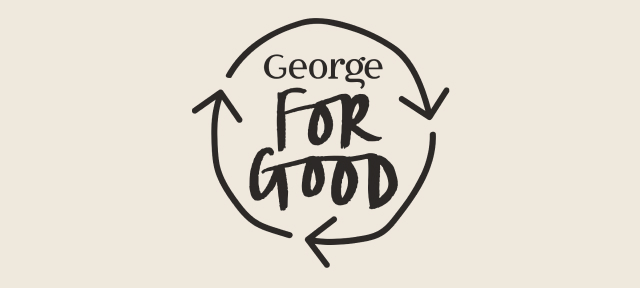
The George for Good roundel features on the George swing ticket alongside an environmental claim and on a select number of our products where the back neck label is a printed label (not a sewn in label).
This can only be used on a swing ticket, or a back neck printed label where a George-branded product fulfils the criteria to be included in the George for Good range: products must contain at least 25% of a fibre that complies with one or more of our environmental fibre policies.
These include: Better Cotton, Organic Cotton, FSC Viscose, any recycled fibres, Reprieve, Vegan products, Low Impact product, CELC Linen, responsibly produced pulp and paper as well as polyester produced from recycled plastic bottles. Satisfaction of the criteria must be evidenced through our certification process, approved by our team before George for Good branding is applied.
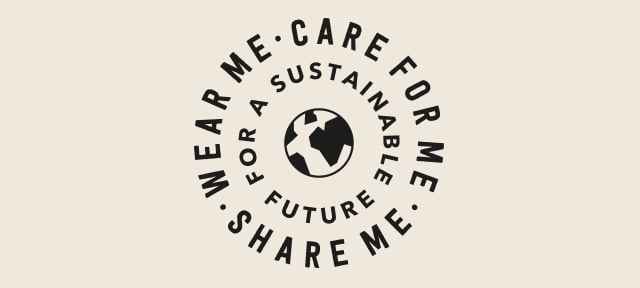
The wear me, care for me, share me for a sustainable future features on the care label of all George clothing, footwear and accessories as well as this messaging being used within the cloud icon on our baby packed product.
There is no George specific target for the use of this messaging on our products. It is used on any George branded item that features a care label. This messaging is designed to encourage our customers to enjoy wearing our products, look after them during wash and wear so they last for as long as possible and share the item by passing the product on where at all possible to be re-used again by someone else.
By encouraging customers to re-use George branded items as long as possible, our aim is to keep as many products out of landfill and once at the end of life, customers can use our take back scheme to recycle textiles in any condition.
Environment Impact Measurement (EIM) is a self-accreditation tool that George denim suppliers use to measure impact on the denim products they manufacture on our behalf at the garment finishing stage.
This claim relates to the manufacturing process used for George denim. George requires all our denim supplier partners and manufacturers to be measured using the EIM tool. This measurement is taken across four categories; water consumption, energy usage, chemical impact and workers health.
There is a benchmark within each category for low {score 0-33}, medium {score 34-66} and high impact {score 66+}. The final scoring across all 4 categories is given as an average of which for George, we require to be Low Impact. The EIM platform has been created by denim specialists Jeanologia who also manufacture the equipment used in the laundering and finishing processes of denim which use less water and energy than traditional laundering and finishing. It is through the use of this equipment that our suppler partners can reduce the impact of the garments they manufacture in line with our requirements.
George does not work directly within Jeanologia, our supplier partners who source denim on George’s behalf work directly with this organisation.
This messaging features on all George outer bags used in transit and product packaging.
The first icon is an industry standard message to explain to consumers that the outer bags used on George products can be returned to our larger stores for recycling. The second indicates that the bags are made from LDPE, low density polyethylene and indicates to local collection authority the material used so this can be sorted to the correct waste stream.
George does not have a target for the use of this message. This is included on the outer bags that we place our packed products into such as baby grow packs or our school shirts or overbags which protect our products during transit. This is placed onto the back of the pack where low-density polyethylene is used. These bags are not generally accepted for recycling at kerb side under current regulations. Where they see this sign, customers can return these bags back to any of our 250 largest stores and we can recycle them through our waste streams. Please see below a list of 250 Asda stores where these can be recycled. We have a specialist bin in store for collection or a store colleague will be able to support customers as/when required. The additional LDPE icon is used to indicate to local collection authorities the composition of the plastic to aid with sortation into the correct waste stream. This icon is used in conjunction with the first, customer recycling icon on our polythene bags.
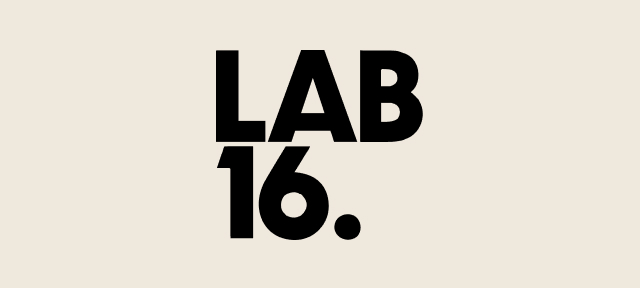
This swing ticket was used on a range of products called, Renew. This was a range of products that were designed to be monofibre so that when the products have reached their end of life and are no longer suitable for wear, being made of a single fibre makes textile recycling easier.
George no longer creates any product within this range and has no targets associated with it. To be included in the range, the products within this range had to be made from one single fibre only (with the exception of trims including threads) for example, 100% cotton or 100% polyester. Being monofibre allows for easier textile recycling at the end of the products life if this reaches a commercial textile recycler.
Practically, if this product is commercially recycled, all of the fibres can be recycled into new yarn and used to produce an alternative product, meaning the quality of the fibres are not weakened by unnecessary blends and they remain valuable in the supply chain. This is dependent on a customer seeking out a commercial textile recycler that has the correct recycling capabilities. This message on the back neck label was used to encourage customers to recycle this product at end-of-life, rather than discarding through waste streams.
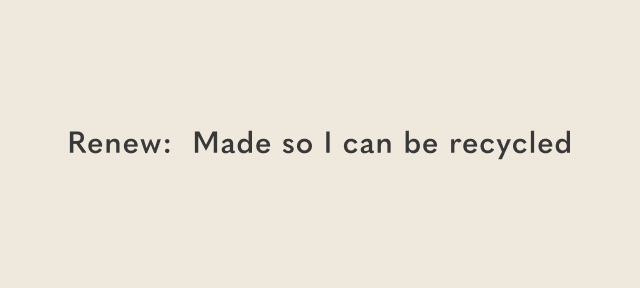
This back neck label was used on a range of products called, Renew. This was a range of products that were designed as monofibre so that when the products have reached their end of life and are no longer suitable for wear, being made of a single fibre makes textile recycling easier.
George no longer creates any product within this range and has no targets associated with it. To be included in the range, the products within this range had to be made from one single fibre only (with the exception of trims including threads) for example, 100% cotton or 100% polyester. Being monofibre allows for easier textile recycling at the end of the products life if this reaches a commercial textile recycler.
Practically, if this product is commercially recycled, all of the fibres can be recycled into new yarn and used to produce an alternative product, meaning the quality of the fibres are not weakened by unnecessary blends and they remain valuable in the supply chain. This is dependent on a customer seeking out a commercial textile recycler that has the correct recycling capabilities. This message on the back neck label was used to encourage customers to recycle this product at end of life, rather than discarding through waste streams.
All of the polyester used within this product is 100% recycled -This is certified by either Global Recycle Standard (GRS) or Recycle Claim Standard (RCS)
By January 2025, George policy is that all polyester within our products must contain a minimum of 30% recycled content. This product contains 100% recycled polyester.
Polyester is a synthetic fibre made from crude oil, using virgin polyester creates demand for fossil fuel extraction which is why we have set a target for recycled polyester which in turn reduces the demand for fossil fuel extraction and the creation of virgin polyester fibre. Recycled polyester can be made from recycling textile waste (already in fibre/fabric form) or from plastic which is melted down to form PET chips. Both of these sources are used to create new fibre which is then spun into yarn and in turn made into new fabric.
Our suppliers are required work with the Global Recycled Standard (GRS) or the Recycled Claim Standard (RCS), both of which are international, voluntary standards established by the Textile Exchange that set out requirements for independent parties to verify the recycled content in a given product. Transaction certificates verify the chain of custody of the recycled fibres as they pass through the supply chain. We also require each facility in the supply chain to have a scope certificate which demonstrates that they can take possession of the recycled content.
The Textile Exchange is a non-profit which aims to drive beneficial impact on climate and nature across the fashion, textile and apparel industries. As part of its work, it has developed a number of voluntary standards relating to organic, recycled and responsibly sourced fibres to help companies and consumers to verify sustainability claims. Through the GRS and RCS specifically, it aims to: align definitions of “recycled” across different applications; verify recycled content in products; and enable brands and consumers to make informed buying decisions.
Our suppliers can use several independent parties to verify their transactions and provide them with the certification we require.
Our suppliers source the Polyester on our behalf and provide us with scope and transaction certificates, verified by an approved governing body to certify that this product has met all requirements of the GRS or RCS standard. George does not directly financially contribute to these organisations as part of the above process. This is in relation to the polyester fibres of this item only.
A minimum of 25% of this product contains recycled fibres - This is certified by either Global Recycle Standard (GRS) or Recycle Claim Standard (RCS)
George policy is that at a minimum of 25% of the product has recycled content but there is no specific target for wadding and lining.
Our suppliers are required work with the Global Recycled Standard (GRS) or the Recycled Claim Standard (RCS), both of which are international, voluntary standards established by the Textile Exchange that set out requirements for independent parties to verify the recycled content in a given product. Transaction certificates verify the chain of custody of the recycled content as it passes through the supply chain. We also require each facility in the supply chain to have a scope certificate which demonstrates that they can take possession of the recycled content.
The Textile Exchange is a non-profit which aims to drive beneficial impact on climate and nature across the fashion, textile and apparel industries. As part of its work, it has developed a number of voluntary standards relating to organic, recycled and responsibly sourced fibres to help companies and consumers to verify sustainability claims. Through the GRS and RCS specifically, it aims to: align definitions of “recycled” across different applications; verify recycled content in products; and enable brands and consumers to make informed buying decisions.
Our suppliers can use several independent parties to verify their transactions and provide them with the certification we require.
Our suppliers source fibres and fabrics on our behalf and provide us with scope and transaction certificates, verified by an approved governing body to certify that this product has met all requirements of the GRS or RCS standard. George does not directly financially contribute to these organisations as part of the above process. This is in relation to the recycled fibres of this item only.
100% of the Linen and flax fibre used within this product must be certified by the Alliance for European Flax - Linen and Hemp, GLOBAL ORGANIC TEXTILE STANDARD (GOTS), Global Recycle Standard (GRS) or Recycle Claim Standard (RCS).
Since 2023, all of the linen and flax fibre used within George branded clothing, footwear and accessories must be certified by either the Alliance for European Flax-Linen and Hemp, the Global Organic Textile Standard (GOTS), Global Recycle Standard (GRS) or Recycled Claim Standard (RCS).
The Alliance for European Flax-Linen and Hemp is a European alliance backed up by independent scope and bulk fibre certificate to prove conformity. The aim of the standard is to guarantee origin and traceability through certification. This certification guarantees the fibre is grown in Western Europe and is produced through integrated crop management farming, without artificial irrigation barring exceptional circumstances or genetically modified organisms (GMO).
Global Organic Textile Standard (GOTS) is a textile processing standard for organic fibres backed up by independent certification of the complete textile supply chain. The aim of the standard is to define globally recognised requirements that ensure organic status of textiles, from the harvesting of the raw materials, through environmentally and socially responsible manufacturing, to product labelling that provides a credible assurance to the end consumer.
Our suppliers are required work with the Global Recycled Standard (GRS) or the Recycled Claim Standard (RCS), both of which are international, voluntary standards established by the Textile Exchange that set out requirements for independent parties to verify the recycled content in a given product. Transaction certificates verify the chain of custody of the recycled fibres as they pass through the supply chain. We also require each facility in the supply chain to have a scope certificate which demonstrates that they can take possession of the recycled content.
The Textile Exchange is a non-profit which aims to drive beneficial impact on climate and nature across the fashion, textile and apparel industries. As part of its work, it has developed a number of voluntary standards relating to organic, recycled and responsibly sourced fibres to help companies and consumers to verify sustainability claims. Through the GRS and RCS specifically, it aims to: align definitions of “recycled” across different applications; verify recycled content in products; and enable brands and consumers to make informed buying decisions.
Our suppliers can use several independent parties to verify their transactions and provide them with the certification we require.
Our suppliers source the linen on our behalf and provide us with scope and transaction certificates, verified by an approved governing body to certify that this product has met all requirements of the standard. George does not directly financially contribute to these organisations as part of the above process. This is in relation to the cotton fibres of this item only.
At least 25% of the overall shoe lining and upper product fibre composition has recycled content. This claim may mean multiple fibres within this product are recycled, e.g. if it contains both cotton and polyester, both may have recycled content. This is certified by either Global Recycle Standard (GRS) or Recycle Claim Standard (RCS)
George policy is that at least 25% of the overall product lining and upper fibre composition has a recycled content but there is no specific target for recycled fibres except for polyester.
Our suppliers are required work with the Global Recycled Standard (GRS) or the Recycled Claim Standard (RCS), both of which are international, voluntary standards established by the Textile Exchange that set out requirements for independent parties to verify the recycled content in a given product. Transaction certificates verify the chain of custody of the recycled fibres as they pass through the supply chain. We also require each facility in the supply chain to have a scope certificate which demonstrates that they can take possession of the recycled content.
The Textile Exchange is a non-profit which aims to drive beneficial impact on climate and nature across the fashion, textile and apparel industries. As part of its work, it has developed a number of voluntary standards relating to organic, recycled and responsibly sourced fibres to help companies and consumers to verify sustainability claims. Through the GRS and RCS specifically, it aims to: align definitions of “recycled” across different applications; verify recycled content in products; and enable brands and consumers to make informed buying decisions.
Our suppliers can use several independent parties to verify their transactions and provide them with the certification we require.
Our suppliers source fibres and fabrics on our behalf and provide us with scope and transaction certificates, verified by an approved governing body to certify that this product has met all requirements of the GRS or RCS standard. George does not directly financially contribute to these organisations as part of the above process. This is in relation to the recycled fibres of this item only.
At least 25% of the overall bra back on this product fibre composition has recycled content. This claim may mean multiple fibres within this product are recycled, e.g. if it contains acrylic and the polyester, both may have a recycled content. This is certified by either Global Recycle Standard (GRS) or Recycle Claim Standard (RCS)
George policy is that at least 25% of the overall bra back on this product fibre composition has a recycled content.
Our suppliers are required work with the Global Recycled Standard (GRS) or the Recycled Claim Standard (RCS), both of which are international, voluntary standards established by the Textile Exchange that set out requirements for independent parties to verify the recycled content in a given product. Transaction certificates verify the chain of custody of the recycled content as it passes through the supply chain. We also require each facility in the supply chain to have a scope certificate which demonstrates that they can take possession of the recycled content.
The Textile Exchange is a non-profit which aims to drive beneficial impact on climate and nature across the fashion, textile and apparel industries. As part of its work, it has developed a number of voluntary standards relating to organic, recycled and responsibly sourced fibres to help companies and consumers to verify sustainability claims. Through the GRS and RCS specifically, it aims to: align definitions of “recycled” across different applications; verify recycled content in products; and enable brands and consumers to make informed buying decisions.
Our suppliers can use several independent parties to verify their transactions and provide them with the certification we require.
Our suppliers source fibres and fabrics on our behalf and provide us with scope and transaction certificates, verified by an approved governing body to certify that this product has met all requirements of the GRS or RCS standard. George does not directly financially contribute to these organisations as part of the above process. This is in relation to the recycled fibres of this item only.
At least 25% of the wadding (garment filling) is of recycled content -This is certified by either Global Recycle Standard (GRS) or Recycle Claim Standard (RCS)
George policy is that at least 25% of the overall wadding fibre composition in this product has recycled content but there is no specific target for recycled fibres in our wadding specifically except for polyester.
Our suppliers are required work with the Global Recycled Standard (GRS) or the Recycled Claim Standard (RCS), both of which are international, voluntary standards established by the Textile Exchange that set out requirements for independent parties to verify the recycled content in a given product. Transaction certificates verify the chain of custody of the recycled content as it passes through the supply chain. We also require each facility in the supply chain to have a scope certificate which demonstrates that they can take possession of the recycled content.
The Textile Exchange is a non-profit which aims to drive beneficial impact on climate and nature across the fashion, textile and apparel industries. As part of its work, it has developed a number of voluntary standards relating to organic, recycled and responsibly sourced fibres to help companies and consumers to verify sustainability claims. Through the GRS and RCS specifically, it aims to: align definitions of “recycled” across different applications; verify recycled content in products; and enable brands and consumers to make informed buying decisions.
Our suppliers can use several independent parties to verify their transactions and provide them with the certification we require.
Our suppliers source fibres and fabrics on our behalf and provide us with scope and transaction certificates, verified by an approved governing body to certify that this product has met all requirements of the GRS or RCS standard. George does not directly financially contribute to these organisations as part of the above process. This is in relation to the recycled fibres of this item only.
A minimum of 30% of the product must contain Repreve branded fibre which is evidenced to George through a scope certificate, certification letter and a purchase order which Repreve certify independently.
George does not have a target associated with the use of Repreve in George branded clothing, footwear or accessories. Repreve is a branded fibre made from recycled materials, both pre and post consumer polyester including plastic bottles. This is fully traceable. This reduces demand for new (virgin) polyester, a synthetic fibre made from crude oil. Using virgin polyester creates demand for fossil fuel extraction. Our suppliers buy this branded fibre from Repreve who issue a scope certificate and a certification letter verified through purchase orders managed by our supply base. This is independently verified by Repreve, this evidence is submitted to the George team for approval.
Our suppliers source materials and components on our behalf and provide us with scope and transaction certificates, verified by an approved governing body to certify that this product has met all requirements of the relevant fibre content standard. George does not directly financially contribute to these organisations as part of the above process. This is in relation to the recycled fibres of this item only.
100% of the pulp and paper used within the card/paper based packaging on this product is certified by either Forest Stewardship Council (FSC), or Programme for the Endorsement of Forest Certification (PEFC)
Our suppliers source the paper and pulp used in all our card/paper based packaging and certify this on our behalf, this is verified by an approved governing body to certify that this product has met all requirements of the FSC or PEFC.
FSC Forest Stewardship Council
Recognised timber certification scheme for the use of wood pulp in the manufacturing supply chain. FSC certification ensures that products come from responsibly managed forests that provide environmental, social and economic benefits. Their principles and criteria provide a foundation for all forest management standards globally.
Programme for Endorsement of Forest Certification (PEFC)
PEFC is the world’s largest forest certification scheme and supplier of certified wood fibre. It is an international non-profit organisation dedicated to promoting sustainable forest management through independent third-party certification. Through its robust chain of custody standard, PEFC establishes the responsibly sourced link between forests and end users.
George does not directly financially contribute to these organisations as part of the above process. This is in relation to the pulp & paper fibres used within the packaging on this product only.
This icon which features on select items of packaging denotes that the packaging producer has contributed financially to national packaging recovery organisation. It is not an indicator that the packaging itself is recyclable.
This Green Dot symbol indicates an agreement is in place between an organisation {either the supplier of the product or the packaging manufacturer} to relieve them of their individual duty to take or recycled used packaging and instead, they financially contribute to Pro-EUROPE who operate the green dot scheme, who manage this on the organisations behalf.
This gives assurance to a given organisation that they are fulfilling their legal requirements in a particular country around taking back packaging or disposing of it in a compliant way.
Green Dot states that they have “30+ years of hands-on experience in extended producer responsibility (EPR), circular design, plastic collection, sorting, and recycling. Through mechanical and chemical recycling, we contribute to solve the plastic waste crisis.”
